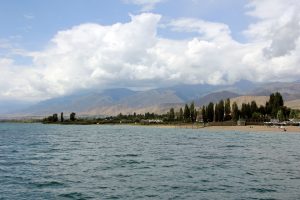Kyrgyzstan and Uzbekistan completed the work of delimiting their border in January 2023. While it’s now clear exactly where one country’s territory ends and the other’s begins, other disputes about infrastructure – some nowhere near the border – remain.
In addition to gas facilities, canals, and a reservoir in Jalalabad province, Uzbekistan owns four resorts on the shore of Issyk-Kul that have caused tension between the two countries.
In the 1960s, Soviet authorities declared Issyk-Kul an “all-Union health resort.” The Soviet Labor Code made vacations mandatory, and the government provided vouchers to visit sanatoriums that offered both rest and medical treatments. At the time, the Kyrgyz Soviet Socialist Republic (SSR) did not have the capacity to build enough resorts to meet demand. The Kazakh and Uzbek SSRs did, however, and they footed the bill to build a handful of sanatoriums and recreational facilities by the lake.
When these countries became independent, ownership of the resorts (along with other infrastructure) was negotiated. In 1992, Kyrgyzstan, Kazakhstan, and Uzbekistan agreed that the resorts would become the property of Kyrgyzstan, but Kazakhstan and Uzbekistan could still operate them in exchange for rent and taxes.
In 2009, the four resorts that the Kazakh SSR had funded were transferred to the Kazakh government on a 49-year lease. That decision sparked concerns about Kyrgyzstan’s territorial sovereignty and questions about whether then-President Kurmanbek Bakiyev profited from the lease.
That same year, Uzbekistan’s Deputy Prime Minister Rustam Azimov said that “legal issues have not been resolved between Kyrgyzstan and Uzbekistan regarding resort and recreation facilities in Issyk-Kul, which Uzbekistan considers its property.”
In April 2016, then-Prime Minister Temir Sariyev asserted Kyrgyz ownership of the four Uzbek resorts. Uzbekistan promptly responded by filing a lawsuit with the International Center for Settlement of Investment Disputes (ICSID), an institution within the World Bank. Although Kyrgyzstan and Uzbekistan resolved the issue in December 2017, Uzbekistan did not withdraw its claim from the ICSID. In May 2023, the ICSID arbitrators decided in favor of Uzbekistan. If Kyrgyzstan would not return the resorts, it would need to pay $33 million to Uzbekistan.
On August 8, Kyrgyzstan asked a U.S. court to annul the payment, but recent public statements by President Sadyr Japarov suggest little optimism about the prospects. In an interview with Kabar, Japarov said it would be impossible to sell the resorts for $4 million, let alone $40 million.
Now, Kyrgyzstan and Uzbekistan have come to an agreement that the four resorts will be leased to Uzbekistan for 49 years. Kyrgyz officials estimate that taxes on the hotels will exceed 130 million som ($1.47 million) each year. No less than 80 percent of employees at the resorts should be Kyrgyz citizens, which Japarov said will lead to the creation of about 200 jobs at each resort.
It is also expected that Uzbek companies will invest $15-20 million into each resort, which are currently in poor shape and in need of restoration. In his Kabar interview, Japarov said, “The state of these resorts leaves much to be desired. They are so dilapidated, that they could really be called sheds.”
The four Uzbek resorts dot a small stretch of the northern Issyk Kul coastline, between the villages of Kara-Oi and Bosteri that flank the city of Cholpon-Ata, a hub for both tourism and diplomacy.
Some 35 miles west, workers are building Kyrgyzstan’s future megacity from scratch. On June 30, Japarov opened construction on the city, called Asman, which he says will be home to 500,000 people. The city is supposedly being financed with foreign investment worth over $20 billion – which is more than 10 times the amount of all republic-wide investments in fixed capital.
These investment projects constitute a catch-22 of sorts for Issyk-Kul. Beach tourism accounts for about 90 percent of Kyrgyzstan’s total tourism sector, which the country is hoping will account for 7 percent of its GDP this year. Construction on resorts and a new city around Issyk-Kul – which is recognized as a U.N. Biosphere Reserve – could further boost the tourism industry and create jobs.
But Issyk-Kul’s tourist season is short, running only from June through the end of August, and investing in more flashy projects does not guarantee sustainable development. Further, environmental activists worry about the sustained effect of pollution on the lake’s ecological situation. Kyrgyzstan may have somewhat limited authority over what happens on the Uzbek-leased resorts, but its political leaders are in a position to develop the region without sacrificing its natural bounty.

































